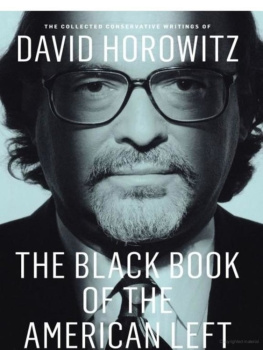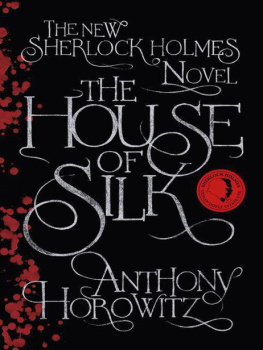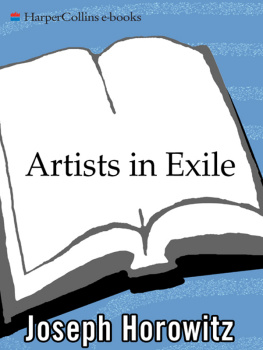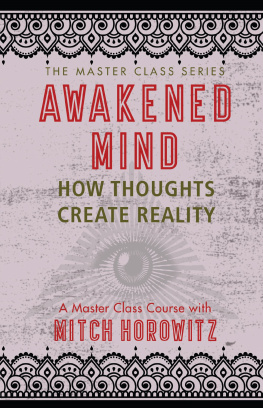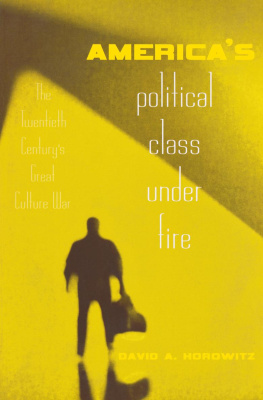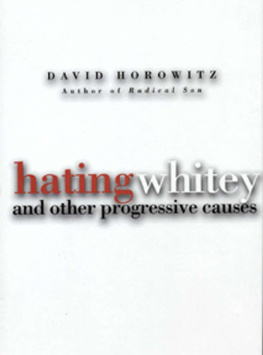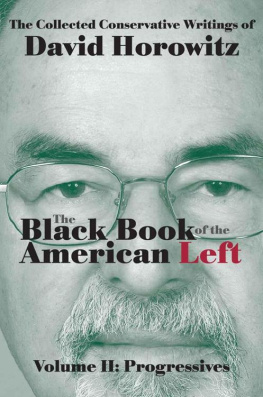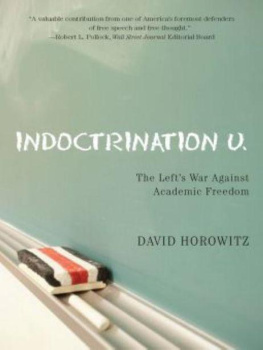Table of Contents
Acknowledgments
T he essays and articles in The Black Book of the American Left and the project itself would not have been possible without the David Horowitz Freedom Center and the dedicated individuals who staff it. Foremost among these are Mike Finch, who is the operating head of the Center, its fundraiser, and an informed counselor in all we do, and Peter Collier who has been my literary collaborator and friend for nearly fifty years. Mike Bauer gathered and helped to edit all the articles contained in these volumes, and John Perazzo and Elizabeth Ruiz helped with the research on many of them. Finally, I wish to acknowledge the love and support of my wife April through the years of writing and editing these volumes, and to thank her for being there for me.
Preface to
The Black Book of the American Left
T he idea for these volumes came about as the result of a self-inventory undertaken to map the development of my political views over the last thirty years. This inquiry involved a survey of all the articles and essays I had written as a conservativesince the day Peter Collier and I published a cover story in the Washington Post Magazine announcing our second thoughts about the left and our departure from its ranks. These writings, which were assembled with the indispensable help of Mike Bauer, added up to more than 690 articles and essays, and a million and a half words. Some were lengthy considerations of big issues, others reactions to current events, and some were polemical responses to political opponents. But when I had looked over this body of work, I realized that virtually everything I had written was really about one subject: the American left.
The ancient Greek poet Archilochus was the author of a philosophical fragment that became the focus of a famous essay by the writer Isaiah Berlin, which he called The Hedgehog and the Fox. In his fragment Archilochus observed, The fox knows many things, but the hedgehog knows one big thing. For whatever reason, in the many years I have been a writer I have never been a fox. It is true that my subjects have been varied, and I have even authored two volumes of philosophical reflections about mortality and life. But the primary focus of my workeven of those thoughts on mortality and existencehas remained one big thing: the nature, deeds and fortunes of the political left.
The first part of my life was spent as a member of the New Left and its Communist predecessor, in which my family had roots. After the consequences of those commitments became clear to me in the mid-1970s, I came to know the left as an adversary; and if sheer volume were the measure, as its principal intellectual antagonist. Some have seen an obsession in my efforts to define the left and analyze what it intends. In a sense that is true; I had left the left, but the left had not left me. For better or worse, I have been condemned to spend the rest of my days attempting to understand how it pursues the agendas from which I have separated myself, and why.
When I was beginning this quest nearly three decades ago, I paid a visit to the New York intellectual, Norman Podhoretz, who had had his own second thoughts a decade earlier, though not from so radical a vantage as mine. Podhoretz asked me why I was spending my time worrying about an isolated community on the fringes of politics. I should focus, he said, on liberals not leftists. This advice reflected what seemed an accurate description of the political landscape at the time. Many would have seconded his judgment when the walls of Communism came tumbling down shortly thereafter. But the progressive faith is just that, a faith, and despite the exceptions of individual cases no fact on the ground will dispel it.
When Podhoretz and I met, progressives and radicals had already escaped the political ghettos to which my parents generation had been reasonably confined. The massive defeat they suffered in the fall of the Marxist states they helped create had the ironic, unforeseen effect of freeing them from the burden of defending them. This allowed them in the next decade to emerge as a major force in American life. In the wake of the Communist collapse, this left has become a very big thingso big that by 2008 it was the dominant force in Americas academic and media cultures, had elected an American president, and was in a position to shape Americas future. Because of its post-Communist metastasis, what Norman Podhoretz once saw as a parochial interest in a fringe cause has become an effort to understand the dominant development in Americas political culture over the last fifty years. That is the subject of these volumes.
The essays contained herein describe the left as I have known it; first from the inside as one of its theorists, and then as a nemesis confronting it with the real-world consequences of its actions. In all these writings I was driven by two urgencies: a desire to persuade those still on the left of the destructive consequences of the ideas and causes they promoted; and second, the frustration I experienced with those conservatives who failed to understand the malignancy of the forces mobilized against them. Most conservatives habitually referred to leftists who were determined enemies of Americas social contract as liberals. In calling them liberals, conservatives failed to appreciate the Marxist foundations and religious dimensions of the radical faith or the hatreds it inspired. And they failed to appreciate the lefts brutal imposture in stealing the identity of the intellectually pragmatic, patriotic, anti-totalitarian Cold War liberals whose influence in American political life they began killing off in 1972 with the McGovern coup inside the Democratic Party.
When this syllabus of my conservative writings was finally assembled and I had read their contents through, I realized that even though they would take up multiple volumes they added up to a single book, which my colleague Peter Collier quickly christened the The Black Book of the American Left (a flattering allusion to The Black Book of Communism, the authoritative 1997 work by several European academics outlining the terror and catastrophe created by communist states.) Contained in these volumes is a diary, written over more than half a century, that describes one mans encounters with a movement which, in the words of its most prominent figure, Barack Obama, is seeking to fundamentally transform the United States of America. The diary records the progress of that transformation, documenting the changes of a shape-shifting movement that constantly morphs itself in order to conceal its abiding identity and mission, which, as these pages will make clear, is ultimately one of destruction.
It is almost a certainty that no other book will be written like this one, since it can only have been the work of someone born into the left and condemned Ahab-like to pursue it in an attempt to comprehend it. Yet this is not so much a project of monomania, as my adversaries will undoubtedly suggest, but of discovery; an attempt not only to understand a movement, but to explore its roots in individual lives, including my own. While I hope this book may be useful to those fighting to defend individual freedom and free markets, I do not deceive myself into believing that I have finally set the harpoon into the leviathan, a feat that is ultimately not possible. Progressivism is fundamentally a religious faith, which meets the same eternal human needs traditional faiths do, and for that reason will be with us always. In the last analysis, the progressive faith is a Gnosticism that can only be held at bay, never finally beaten back to earth.

